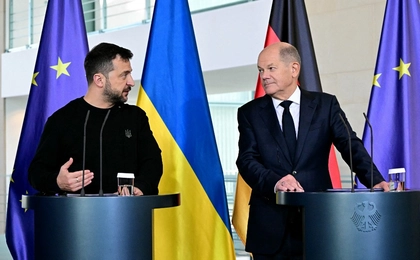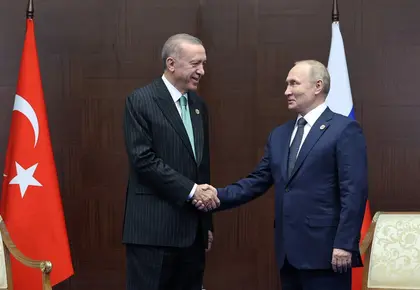Turkish President Recep Tayyip Erdogan visits his Russian counterpart Vladimir Putin on Monday in a long-shot bid to revive a Ukrainian grain export agreement in time for the autumn harvest.
Erdogan's first face-to-face meeting with Putin since October comes as Russian forces try to hold off a new Kyiv offensive that has started to show promise after three months of brutal battles along Ukraine's southern front.
The Turkish leader hopes to use the informal summit in the Black Sea resort of Sochi as a basis for peace negotiations that some Western officials are debating, but that both sides only want held on their own terms.
Erdogan has been one of the few leaders within the NATO defence alliance to maintain open access to Putin.
The two leaders have had a close but tempestuous relationship that appears to have grown stronger since Russia launched its "special military operation" in February 2022.
Putin's decision to discount and delay Turkey's payments for Russian gas imports helped ease an economic crisis that almost kept Erdogan from winning re-election in May.
Turkey reciprocated by refusing to join Western sanctions on Moscow and becoming a crucial venue for Russia to access services and goods.
But Erdogan has also irritated Putin by supplying Ukraine with weapons and backing its ambitions to join NATO.
The Kremlin grew particularly angry when Erdogan in July allowed visiting Ukrainian President Volodymyr Zelensky to bring back five commanders that Russia sent to Turkey in a major prisoner swap.

Ukraine Slams Scholz After First Call With Putin in Two Years
The commanders were meant to stay in Turkey and the Kremlin warned that it would "take this into account in our future agreements" with Erdogan.
Yet both Moscow and Kyiv are now seeking Erdogan's backing in their standoff over grain and hostilities in the Black Sea.
- 'Only promises' -
Russia followed its break from the grain deal in July with repeated strikes against Ukrainian port infrastructure that Kyiv countered with its own attacks around the Black Sea.
It marked the end of the only major deal signed by the two sides during the fighting.
Ukraine's ability to export more than 32 million tonnes of grain under the agreement pushed down global food prices and eased hunger in Africa and parts of the Middle East.
Turkey helped broker the UN-backed agreement and is now trying to revive it to regain the diplomatic prestige of being a crucial intermediary between Moscow and Kyiv.
Erdogan dispatched Foreign Minister Hakan Fidan to Kyiv and Moscow to prepare the talks with Putin and try to keep the sides from pushing ahead with their own rival plans to export grain.
Ukraine has sent four ships to test a new route that enters international waters only briefly and largely follows those controlled by NATO members -- and thus less prone to Russian attack.
Moscow has pushed its own proposal to supply free foodstuffs to Africa and send discounted grain for processing in Turkey under a proposed deal involving Qatar.
Russia says last year's deal failed to lift indirect restrictions on its grain and fertiliser exports that existed because of Western curbs on Moscow's access to global payment systems and insurance.
Russian Foreign Minister Sergei Lavrov also brushed aside a new grain proposal from UN Secretary-General Antonio Guterres that Hakan promoted in Moscow.
"There still isn't a single guarantee in this (proposal), only promises," Lavrov said.
You can also highlight the text and press Ctrl + Enter






